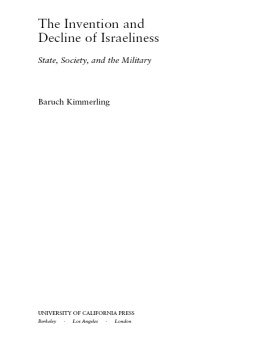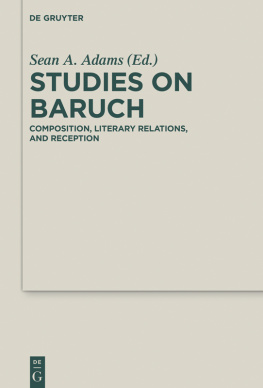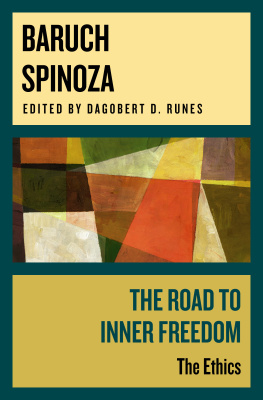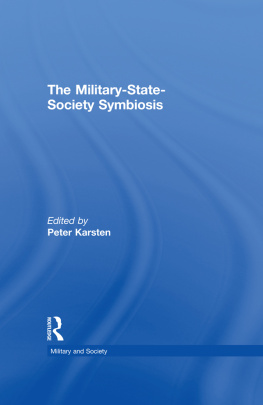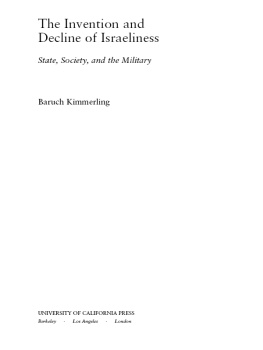Baruch Kimmerling - The Invention and Decline of Israeliness: State, Society, and the Military
Here you can read online Baruch Kimmerling - The Invention and Decline of Israeliness: State, Society, and the Military full text of the book (entire story) in english for free. Download pdf and epub, get meaning, cover and reviews about this ebook. publisher: University of California Press, genre: Politics. Description of the work, (preface) as well as reviews are available. Best literature library LitArk.com created for fans of good reading and offers a wide selection of genres:
Romance novel
Science fiction
Adventure
Detective
Science
History
Home and family
Prose
Art
Politics
Computer
Non-fiction
Religion
Business
Children
Humor
Choose a favorite category and find really read worthwhile books. Enjoy immersion in the world of imagination, feel the emotions of the characters or learn something new for yourself, make an fascinating discovery.
- Book:The Invention and Decline of Israeliness: State, Society, and the Military
- Author:
- Publisher:University of California Press
- Genre:
- Rating:5 / 5
- Favourites:Add to favourites
- Your mark:
- 100
- 1
- 2
- 3
- 4
- 5
The Invention and Decline of Israeliness: State, Society, and the Military: summary, description and annotation
We offer to read an annotation, description, summary or preface (depends on what the author of the book "The Invention and Decline of Israeliness: State, Society, and the Military" wrote himself). If you haven't found the necessary information about the book — write in the comments, we will try to find it.
The Invention and Decline of Israeliness: State, Society, and the Military — read online for free the complete book (whole text) full work
Below is the text of the book, divided by pages. System saving the place of the last page read, allows you to conveniently read the book "The Invention and Decline of Israeliness: State, Society, and the Military" online for free, without having to search again every time where you left off. Put a bookmark, and you can go to the page where you finished reading at any time.
Font size:
Interval:
Bookmark:

THE S. MARK TAPER FOUNDATION
IMPRINT IN JEWISH STUDIES

BY THIS ENDOWMENT
THE S. MARK TAPER FOUNDATION SUPPORTS
THE APPRECIATION AND UNDERSTANDING
OF THE RICHNESS AND DIVERSITY OF
JEWISH LIFE AND CULTURE
The Invention and Decline of Israeliness
State, Society, and the Military
Baruch Kimmerling
UNIVERSITY OF CALIFORNIA PRESS
Berkeley Los Angeles London
The publisher gratefully acknowledges the generous contribution to this book provided by the S. Mark Taper Foundation
University of California Press
Berkeley and Los Angeles, California
University of California Press, Ltd.
London, England
2001 by the Regents of the University of California
Library of Congress Cataloging-in-Publication Data
Kimmerling, Baruch.
The invention and decline of Israeliness : state,
society, and the military / Baruch Kimmerling.
p. cm.
Includes bibliographical references and index.
ISBN 0-520-22968-1 (cloth : alk. paper).
1. National characteristics, Israeli. 2. Jews
IsraelIdentity. 3. IsraelSocial conditions
20th century. 4. IsraelEthnic relations.
5. Religion and stateIsrael. I. Title.
DS113.3.K56 2001
306'.095694dc21 00-067238
Manufactured in the United States of America
10 09 08 07 06 05 04 03 02 01
10 9 8 7 6 5 4 3 2 1
The paper used in this publication is both acid-free and totally chlorine-free (TCF). It meets the minimum requirements of ANSI/NISO Z39.48-1992 (R 1997) (Permanence of Paper). 
To Diana
Without whose lifelong support I would
have had nothing
Acknowledgments
This book is a summary of an approximately ten-year process of professional and intellectual discussions, debates, and sometimes bitter controversies with friends, colleagues, students, and rivals. I have been fortunate enough to be surrounded by highly stimulating intellectual environments in the offices, faculty clubs, and corridors of the Hebrew University and the University of Washington at Seattle. I have also been supported and spoiled by a vivid global exchange through the wonders of the Internet and the electronic mail system. The names of those who have contributed to these environments are so innumerable that, with the exception of the late Dan Horowitz, I shall refrain from listing them. The final version was rewritten following very thoughtful, wise, and constructive comments of three anonymous peer reviewers of the University of California Press.
I would like to thank my devoted students and assistants who have aided me throughout all these years and made possible the implementation of this mission: Jon Simons, Matthew Diamond, Lauren Erdreich, Michal Laron, Hagit Schwartz, and Keren-Or Schlesinger. I also am pleasantly indebted to the Eshkol Center of Israel Studies and to the Silbert Center for Research of Israeli Society and Director Arieh Schachar for their generous support in funding the research demanded by the present volume. I am deeply grateful to Malcom Reed and Cindy Fulton of the University of California Press, who handled the manuscript so carefully, and special thanks to Peter Dreyer for his excellent editorial work.
Parts of this volume are based on previously published material. 's main source is an essay titled Political Subcultures and Civilian Militarism in a Settler-Immigrant Society, published in Security Concerns: Insights from the Israeli Experience, edited by Daniel Bar-Tal, Dan Jacobson, and Aharon Klieman (Stamford, Conn.: JAI Press, 1998), pp. 395-416.
I am grateful to all the publishers who so generously granted me the right to use the material. Nonetheless, all these papers served only as foundations for the present chapters of this volume. Most were completely rewritten to include (or sometimes exclude) new material and ideas and to present a coherent narrative.
Introduction
This book offers an overview and analysis of the construction and deconstruction of hegemonic, secular Zionist Israeli national identity from the early years of the Zionist movement to the present. Today, for better or for worse, Israel is a very different polity than was envisioned by any of the streams of Zionism, or even by the builders of the Israeli state and society. During the past two decades, changes have accelerated, and few earlier assumptions about Israel's demographic composition, political and social boundaries, cultural character, or social and economic structures remain valid. In addition, Israel is undergoing processes of change in position and location on both the international and regional planesprocesses that are strongly interlinked with domestic developments.
Nevertheless, the changes in rhetoric and social roles have left some of Israel's core characteristics and social institutions unaltered. Israel is still an active immigrant settler society, domestically and externally a relatively strong state (even if less stable than in the past), based on two deep cultural codes, common at least to its Jewish citizensmilitarism and Jewishness. The increasing Jewish sentimenta mixture of secular nationalism and mainly popular-fundamentalist religiousnessis at the same time a partial continuation of the initial social order and a consequence of its decline.
Perhaps the most dramatic changes that have occurred in Israel are the evaporation of the image of a single, unified Israeli society, the decline of a unique Israeli identity (notwithstanding excluded and marginal groups, such as the Arabs and Orthodox Jews), and the diminishment of hegemonic secular Hebrew culture. Within the Israeli state, a system of cultural and social plurality is emerging, but in the absence of a concept or ideology of multiculturalism. Today, Israel is undergoing an accelerated process of invention, creation, and institution-building by about seven different cultures and countercultures, without an accepted hierarchy among them. These cultures are based on and reinforced by ethnic, class, and religious components and differ in the sharpness of their social boundaries, the level of their organization, and their consciousness of the degree to which they are separate.
This process is being complemented by another trend, the subdivision of Israeli identity, nationalism, and collective memory into many versions, with only a soft common core. The result has been not only a process of reshaping collective identity but also a continuous conflict over the meaning of what might be called Israeliness, the rules of the game, and the criteria for distribution and redistribution of common goods.
The seven cultures, which are each presently in different stages of crystallization, are the previously hegemonic secular Ashkenazi upper middle class, the national religious, the traditionalist Mizrahim (Orientals), the Orthodox religious, the Arabs, the new Russian immigrants, and the Ethiopians. Although none of these social groups is homogeneous, and most of them harbor deep political and ideological divergences (e.g., hawks vs. doves), each still holds on to a separate collective identity and also wages an open cultural war against the others.
It seems that two contradictory phenomena have occurred within the Israeli state. The first phenomenon entails the decomposition of the original Zionist hegemony into many conflicting ideological and institutional segments, which have created a kind of diverse degree of separatist civil society or societies, as was mentioned above. The second phenomenon entails the persistence of the state's strength and centralityin terms of both monopolizing regulation of the common good and passing legislation, as well as playing a key role in the continuous interrelations between the cultural sphere and the might and myth of the state's military.
Font size:
Interval:
Bookmark:
Similar books «The Invention and Decline of Israeliness: State, Society, and the Military»
Look at similar books to The Invention and Decline of Israeliness: State, Society, and the Military. We have selected literature similar in name and meaning in the hope of providing readers with more options to find new, interesting, not yet read works.
Discussion, reviews of the book The Invention and Decline of Israeliness: State, Society, and the Military and just readers' own opinions. Leave your comments, write what you think about the work, its meaning or the main characters. Specify what exactly you liked and what you didn't like, and why you think so.

